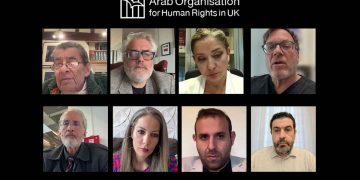The suffering of Jordanian journalist Abdulrahman Farhana, detained in Saudi Arabia, has worsened due to what has been described as deliberate medical neglect, leading to a significant rise in his already-existing diabetes condition.
Saudi State Security forces arrested Farhana on 22 February 2019 at a checkpoint near Dammam Airport while he was on his way to Jeddah.
Following his arrest, Farhana was taken to his home, where officers searched the premises and confiscated his mobile phone and laptop before taking him to an undisclosed location. He was not allowed to bring the medication he requires to treat chronic conditions such as high blood pressure, diabetes, and cerebral ischaemia.
Farhana remained forcibly disappeared for four months, during which he was denied any contact with his family. His relatives were unable to obtain any information about his whereabouts despite repeatedly approaching Saudi authorities, including State Security and several prisons such as Dhahban Prison and the General Investigation Prisons in Dammam and Riyadh. Farhana’s name did not appear in any official records during that period.
On 8 March 2020, Farhana appeared before the Saudi Public Prosecution to face charges including “belonging to or assisting a terrorist entity”, referring to the Palestinian resistance. After a trial before the Specialised Criminal Court, he was sentenced on 8 August 2021 to 19 years in prison, later reduced to nine and a half years.
Since his arrest, Farhana has reportedly been subjected to psychological and physical ill-treatment, and his health has deteriorated further due to medical neglect and poor detention conditions. In 2020, under the pretext of the COVID-19 pandemic, he was again placed in solitary confinement for six months.
On 18 November 2022, the UN Working Group on Arbitrary Detention issued Opinion No. 84/2022, concluding that Abdulrahman Farhana’s detention was arbitrary and calling for his immediate release.
The UN body expressed concern over “the systemic problem of arbitrary detention in Saudi Arabia”, noting that more than 70 cases of human rights violations in the kingdom had been documented since it began its work. The report stated that such practices may amount to crimes against humanity under international law.
The continued use of arbitrary detention and unfair trials against journalists and dissidents violates Saudi Arabia’s international human rights obligations and calls for urgent international action to end these abuses.



























